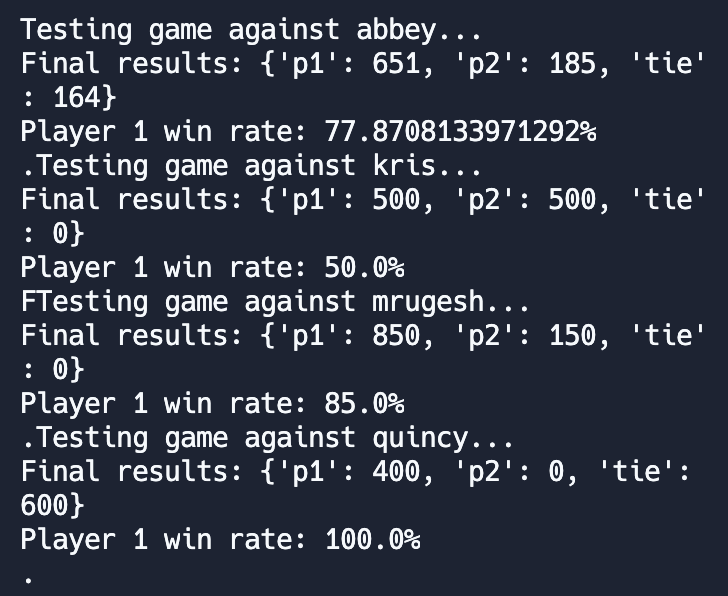Hello,
I am having some inconsistencies in whether my code passes for the RPS project. Here are some examples:
vs
I didn’t notice this until after I submitted, unfortunately, so I’d like to clear it up quickly in case I get audited. I am wondering what could be causing this type of performance.
Here is my code:
import numpy as np
import random
def player(prev_play, opponent_history=[], self_history = [], Q=np.zeros((3,3,27))):
opponent_history.append(prev_play)
op_hist= opponent_history.copy()
original = True
while original:
try:
op_hist.remove('')
except: break
ideal_response = {'R' : 'P', 'P':'S', 'S':'R'}
guess = 0
# Update Q table
states = ['RRR' , 'RRP', 'RRS', 'RPP', 'RPR', 'RPS', 'RSS', 'RSP', 'RSR',
'PRR' , 'PRP', 'PRS', 'PPP', 'PPR', 'PPS', 'PSS', 'PSP','PSR',
'SRR' , 'SRP', 'SRS', 'SPP', 'SPR', 'SPS', 'SSS', 'SSP', 'SSR'
]
actions = ['R', 'P', 'S']
plays = ['R', 'P', 'S']
if len(op_hist) > 4:
# previous three opponent moves before my last move
last_three = ''.join(op_hist[-4:-1])
last_state = states.index(last_three)
last_action = self_history[-2] # my second last play
action = actions.index(last_action)
last_play = self_history[-1] # my last play
play = plays.index(last_play)
last_opponent_play = op_hist[-1]
if last_play == ideal_response[last_opponent_play]: # if I won
Q[play, action, last_state] += 1
elif last_play == last_opponent_play: # if I tied
Q[play, action, last_state] += 0
else:
Q[play, action, last_state] += -1 # if I lost
# If at least 50 plays done, then check for patterns
if len(op_hist) >=50 :
# Check for patterns in their responses
string_responses=''
for i in range(50):
string_responses = string_responses + op_hist[-i]
maximum = 0
for pattern in ['RR','SS','PP']:
maximum = maximum + string_responses.count(pattern)
# If a pattern >= 60% of the time, play what beats it
if maximum >= 15 :
for pattern in ['RR','SS','PP']:
if op_hist[-1] == pattern[0]:
predicted_next = pattern[-1]
guess = ideal_response[predicted_next]
original = False
elif maximum < 15 :
# Check for patterns dependent on previous self throw
countRP = 0
countSR = 0
countPS = 0
for i in range(1,50):
throw=self_history[-i]
response=op_hist[-i+1]
if (throw == 'R') & (response == 'P'):
countRP = countRP + 1
elif (throw == 'S') & (response == 'R'):
countSR = countSR + 1
elif (throw == 'P') & (response == 'S'):
countPS = countPS + 1
patterns= {'RP': countRP, 'SR':countSR, 'PS': countPS}
#If pattern exists >60% of the time, play what beats it
if sum(patterns.values()) > 30:
for pattern in patterns.keys():
if pattern[0] == self_history[-1]:
predicted_response = pattern[1]
guess=ideal_response[predicted_response]
original = False
# If no patterns, play based on Q table
if ((len(op_hist) > 20) & (original is True)) :
direct_last_three = ''.join(op_hist[-3:]) # last three opponent moves
current_state = states.index(direct_last_three)
current_action = actions.index(self_history[-1]) # my previous play
i = np.argmax(Q[:, current_action, current_state]) # most likely prev + next move that results in me winning
guess = plays[i]
# Random guess up to 20
elif len(op_hist) <= 20:
guess = (random.sample(plays,1))[0]
self_history.append(guess)
return guess
The latest part I added was the Q table (I know it’s not really a Q learning table, but I am calling it that for lack of a better name). Before this part, it consistently passed the everyone except abbey (consistent failure).
I thought I added the Q table strategy in such a way that it would only affect the games against abbey, since the other methods are used if they work (>60% of the time). But, now it is sometimes failing kris, and also sometimes failing abbey. Also, the win rates are varying by >15% for abbey, and > 50% for kris. The other two players are still consistently passing.

